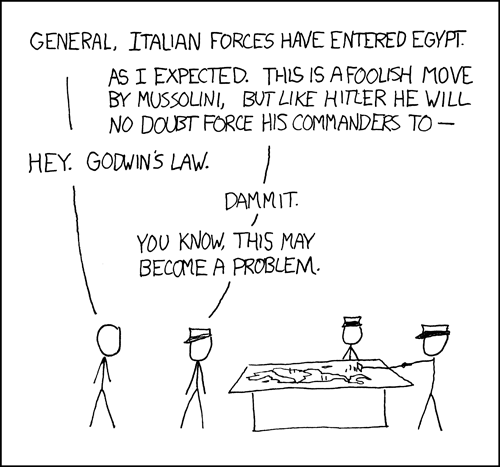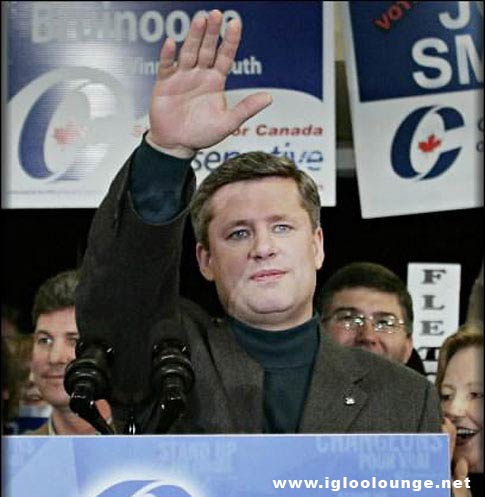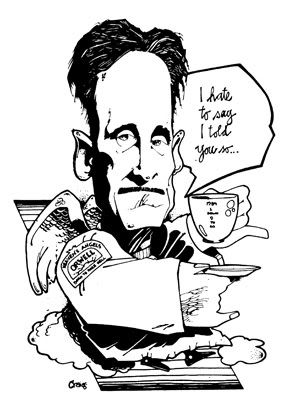
Seo i an oiche, Oiche Shamhna,
when the veil between the worlds is thin.
A time to acknowledge our ancestors.
Darkness comes, and we light the fires.
Fray Luis de León, the great humanist scholar of the Spanish Golden Age, one of the sages of Salamanca University, was condemned by the Inquisition for translating the Song of Solomon and spent four years in prison before being allowed to return to his lectern, where he began his first lecture with the phrase, "Decíamos ayer": "As we were saying yesterday..."


 The End of International Law?
The End of International Law? Andrew J. Bacevich:
Andrew J. Bacevich: 
 Only peace protects freedoms
Only peace protects freedoms



 Thomas Walkom: The great question that remains is what the U.S. will do. It's never been the pure private-enterprise nation that it claims to be. Historically, government has played a key role in American economic development and continues to do so, usually under the guise of military spending.
Thomas Walkom: The great question that remains is what the U.S. will do. It's never been the pure private-enterprise nation that it claims to be. Historically, government has played a key role in American economic development and continues to do so, usually under the guise of military spending. William Pfaff: The nuclear physicist Leo Szilard once remarked that the fall of the Soviet system would eventually lead to the fall of the American system. In a two-element structure, the interrelationship and interdependence are such that the one cannot survive without the other... Georgi Arbatov, former head of the USA and Canada Institute of the Soviet Union, said to an American interlocutor: We are about to do something truly terrible to you. We are going to deprive you of your enemy.
William Pfaff: The nuclear physicist Leo Szilard once remarked that the fall of the Soviet system would eventually lead to the fall of the American system. In a two-element structure, the interrelationship and interdependence are such that the one cannot survive without the other... Georgi Arbatov, former head of the USA and Canada Institute of the Soviet Union, said to an American interlocutor: We are about to do something truly terrible to you. We are going to deprive you of your enemy.


 Nobel Peace Prize laureate Muhammad Yunus:
Nobel Peace Prize laureate Muhammad Yunus: .jpg) In a system of production, where the entire continuity of the reproduction process rests upon credit, a crisis must obviously occur -- a tremendous rush for means of payment -- when credit suddenly ceases and only cash payments have validity. At first glance, therefore, the whole crisis seems to be merely a credit and money crisis. And in fact it is only a question of the convertability of bills of exchange into money.
In a system of production, where the entire continuity of the reproduction process rests upon credit, a crisis must obviously occur -- a tremendous rush for means of payment -- when credit suddenly ceases and only cash payments have validity. At first glance, therefore, the whole crisis seems to be merely a credit and money crisis. And in fact it is only a question of the convertability of bills of exchange into money. "The psychopath is unfamiliar with the primary facts or data of what might be called personal values and is altogether incapable of understanding such matters. It is impossible for him to take even a slight interest in the tragedy or joy or the striving of humanity as presented in serious literature or art. He is also indifferent to all these matters in life itself... He is furthermore, lacking in the ability to see that others are moved.
"The psychopath is unfamiliar with the primary facts or data of what might be called personal values and is altogether incapable of understanding such matters. It is impossible for him to take even a slight interest in the tragedy or joy or the striving of humanity as presented in serious literature or art. He is also indifferent to all these matters in life itself... He is furthermore, lacking in the ability to see that others are moved. Mike Watkins: Facing accusations he is running a deficit already, Conservative leader Stephen Harper denies the charge: "No. That's absolutely not the case." Yet to date this year the Harper government has racked up more than $20 billion in new public debt, an amount far larger than during any similar time or period during the last 8 years. What is Stephen Harper hiding?
Mike Watkins: Facing accusations he is running a deficit already, Conservative leader Stephen Harper denies the charge: "No. That's absolutely not the case." Yet to date this year the Harper government has racked up more than $20 billion in new public debt, an amount far larger than during any similar time or period during the last 8 years. What is Stephen Harper hiding? Margaret Atwood,
Margaret Atwood, 
 The core of any government reflects the personality of the prime minister, because everyone in the system responds to his or her ways of thinking, personality traits, political ambitions and policy preferences...
The core of any government reflects the personality of the prime minister, because everyone in the system responds to his or her ways of thinking, personality traits, political ambitions and policy preferences...
 George Orwell, on how to avoid thinking when you speak:
George Orwell, on how to avoid thinking when you speak:




